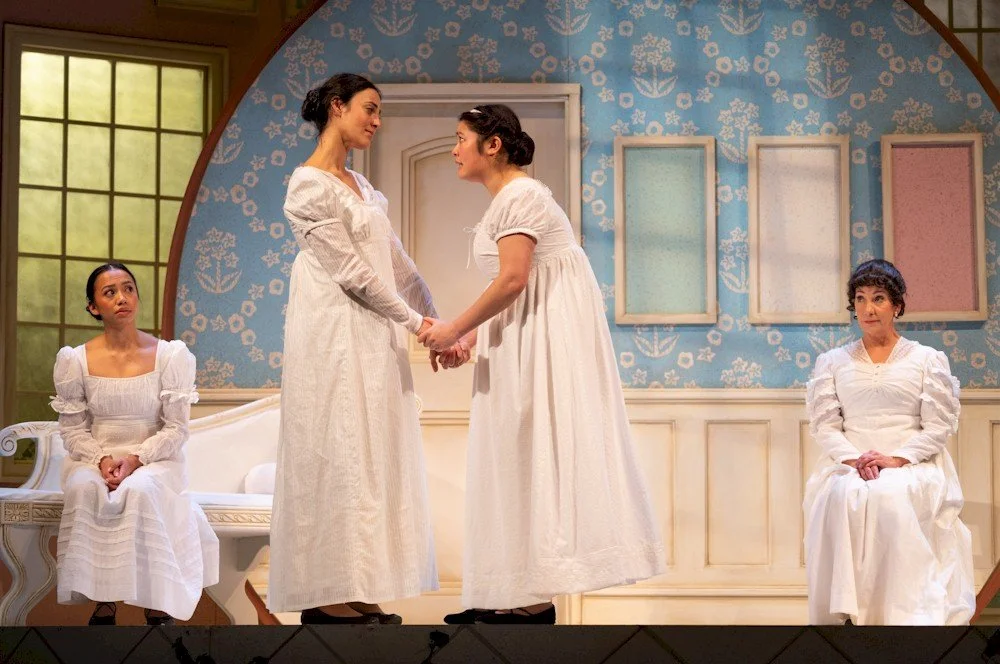Theatre Review: Sense and Sensibility delivers frothy, boisterous fun
The Arts Club’s take on Kate Hamill’s stage adaptation of the Jane Austen classic is delightfully playful
Sense and Sensibility, Arts Club Theatre Company. Photo by Moonrider Productions
The Arts Club Theatre Company presents Sense and Sensibility at the Stanley Industrial Alliance Stage to April 2
DRAMA CAN PROVOKE deep emotions, challenge authority, and inspire change. But sometimes, all you want from a night out at the theatre is a bit of frothy fun. And if Vancouver needs anything right now, after a miserable extended winter and a tridemic, it’s the delightful romp that is Kate Hamill’s stage adaptation of the famed Jane Austen classic, Sense and Sensibility.
While Austen’s novel can be read as a social critique of Georgian upper-crust society, Hamill’s play, directed here by Rachel Peake, transforms it into a proper comedy of manners. As Austen fans well know, the work’s title alludes to the contrasting personalities of sisters Elinor and Marianne Dashwood, who are coming of age after the recent death of their father. Elinor is all soundness and self-control, while Marianne is all emotion and passion. And everyone around them is eager to see them married off.
They, with their mother and younger sister, Margaret, are forced out of their sizeable family estate, Norland Park, when their older half-brother inherits it and promptly moves in with his wife, who is disinclined to share. The Dashwoods move to a modest Barton Cottage near the home of Mrs. Dashwood’s cousin, the gossip-hungry Sir John Middleton and his equally insatiable mother-in-law, Mrs. Jennings. Chat circulates constantly about who’s wooing whom, what land they own, and who’s inheriting what. (While society has evolved since the 1800s, a glimpse at TMZ is enough to confirm that some things never change. )
The script bubbles over with humour, cleverly embodying gossip as a Greek chorus of figures who react with exaggerated delight at the peccadillos of the humans whose hearts are being wrenched all over the place. But it’s thanks to the skills of the cast that the real laughs are delivered. Amanda Sum, as the guileless Marianne, is at once hilarious and earnest, with a natural comedic ability that never feels forced—whether she’s lecturing others on the proper recitation of Hamlet or proclaiming gleefully that her love interest, John Willoughby, “is giving me a HORSE!”
Elinor, her foil, is played by Nyiri Karakas, who quietly trembles with repressed emotion rather than let it overtake her as her sister does. Hers is the least extroverted role, but she, too, has some twinkling moments—her eyes bugging out when the object of her affections dips his quill in her inkwell (the innuendos couldn’t be more overt) and lecturing Marianne on the impropriety of writing, gasp, letters to Willoughby.
The rest of the players take multiple roles, popping up as Gossips, servants, love interests, and wealthy socialites. Nora McLellan, as the busybody Mrs. Jennings and matriarchal Gossip, brims over with playfulness, and Andrew McNee, as both Middleton and a Gossip (along with doctor and servant), is deliciously snide and campy.
People and places can get a little muddled if you’re not paying close attention–especially with the cast dressed all in white, apart from the Gossips, whose costumes are marked with black writing. That simplicity carries over to the spareness of props. Dinner scenes are mimed, with the actors in chairs that wheel around each other in a kind of a dance.
Of course, there are important themes in Austen’s story: the precariousness of wealth; the unhealthy obsession with status; the pressures on women to conform to societal norms. But these are left to the more sober adaptations that have come before. Here, we’re treated to joyful, boisterous fun. Turns out it’s exactly what we needed.














